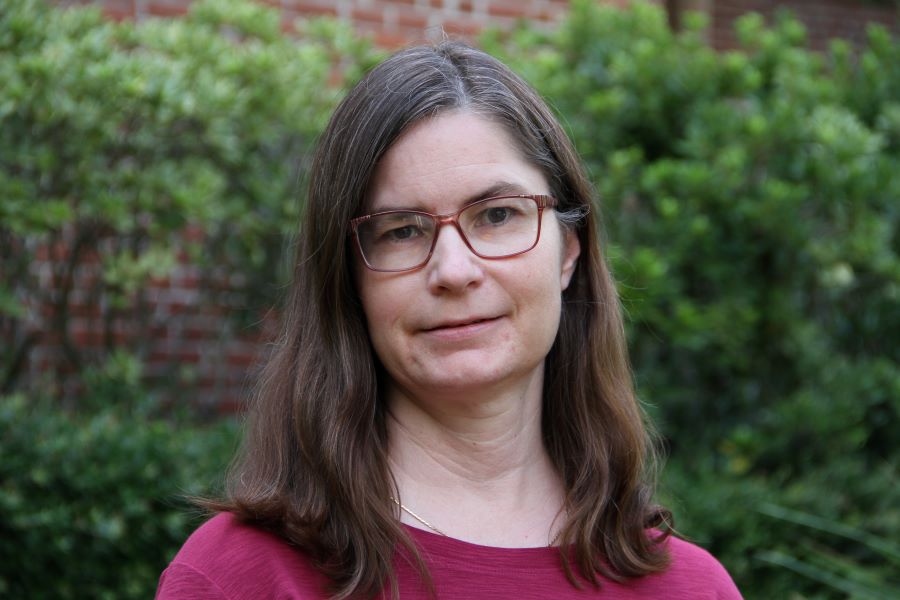Faculty Spotlight: Andrea Westlund

Andrea Westlund is a professor in the Department of Philosophy, part of Florida State University’s College of Arts and Sciences. She earned her doctoral degree in philosophy from the University of Michigan in 2001, her master’s degree in philosophy from Queen’s University in 1995, and her bachelor’s degree in philosophy and economics from the University of Winnipeg in 1994. Westlund’s research interests include the study of ethics, moral psychology and feminist philosophy, and she has published more than two dozen journal articles and book chapters during her time as a researcher and professor.
Tell us a little about your background and what brought you to FSU.
I came to FSU as a faculty member in Fall 2018. This was a mid-career move for me and an opportunity to join a department with an especially strong research cluster in my areas of interest. Prior to this move, I taught at the University of Wisconsin in Milwaukee for 15 years, and before that, I spent two years as an assistant professor at the University of Pittsburgh.
Can you break down your areas of academic interest for us?
I specialize in moral psychology, which is an area of philosophy that lies at the intersection of ethics, theory of agency, philosophy of mind and metaphysics. My main research project concerns the nature of personal autonomy, or the question of what makes us self-governing. I’m interested in how autobiographical storytelling figures in someone’s understanding of self. I have also written about emotions related to wrongdoing and loss, including blame, forgiveness and grief. I teach courses on these topics, as well as courses in philosophy of law, philosophy of feminism, and other areas of applied ethics and social philosophy.
What do you want the public to know about your research? Why are your topics important?
We all experience losses and disappointments, and we all confront wrongdoing and the need for moral repair in one way or another. The ethics of anger, blame, and forgiveness are important in everyday life. Likewise, the question of what makes us self-governing is significant because of our everyday concerns. How and when should we be open to the influence of others, and where must we exercise our own judgement? What does it mean to “be oneself”? It’s important to recognize that being autonomous as human beings is not actually a solitary endeavor. We all rely on others; the tricky thing is figuring out which forms of interconnectedness enhance our agency, which compromise it, and how.
Who are your role models? Are there certain people who have influenced you most in your life and career?
My dissertation supervisor David Velleman, professor emeritus of philosophy and bioethics at New York University, was a wonderful mentor. He gave me confidence in my own philosophical voice, and I try to follow his example in mentoring my own students. I was fortunate to have many other great teachers as well. Among them, Elizabeth Anderson, professor of philosophy at University of Michigan, and Sally Haslanger, Ford Professor of philosophy and women’s and gender studies at the Massachusetts Institute of Technology, both paved the way for my generation of women in philosophy and brought feminist philosophy more into the mainstream. I continue to be inspired by those who work to make philosophy more accessible and more welcoming.
What is your favorite part of your job? What is the most challenging part of your job?
I find myself enjoying philosophy most when I’m participating in workshops and conferences where researchers come together to share their works-in-progress with one another. The most difficult part of philosophy is probably bringing an idea from its early, fuzziest form to something sharp, clear, and distinctive enough to attract productive debate.
What is your best memory so far from working at FSU?
I have been at FSU for five years, but it feels like there was a hole in the middle of that time created by the COVID-19 pandemic. The intellectual community that is so important to philosophy temporarily became harder to find and sustain. When that community started to come back, I realized how much I missed it. For example, last year several of our graduate students organized a wonderful, in-person conference for our local chapter of Minorities and Philosophy for the first time since before the pandemic. I remember a distinct moment at the post-conference dinner, with graduate students making connections with one another, where it hit me how fortunate we were to be able to gather like that again.
Do you have any exciting upcoming projects or goals you’re working towards?
My latest project is on the philosophy of friendship. In my own earlier work on love and shared agency, I treated friendship as an active partnership, in which the friends form a deliberative unit and pursue shared projects and goals. Recently, however, I have been thinking about long-term friendship that persists even though the friends do not engage in a lot of shared activity or see one another very often. I’m interested in understanding the nature and value of such friendships, as distinct from the more widely discussed, activity-oriented sort of friendship that I originally studied.
What do you like to do in your free time?
I like hiking, kayaking and being out in nature, so I have enjoyed exploring the parks, trails, and other natural areas around Tallahassee. I’m also an avid gardener. I grew up in one of the coldest cities in North America, so I relish the fact that I can grow vegetables throughout the winter here.
If your students only learned one thing from you (of course, hopefully they learn much more than that) what would you hope it to be?
I would want them to recognize and embrace many of the problems and questions they already care about in their own lives as philosophical problems. I hope they carry the style of thinking and discussion that philosophy encourages into the rest of their lives.
